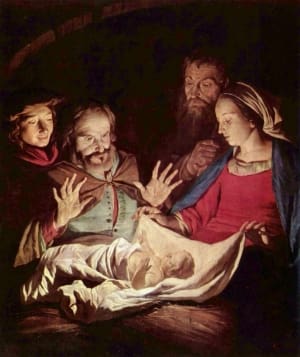A blog for Catholic men that seeks to encourage virtue, the pursuit of holiness and the art of true masculinity.
The True Story

The advent of Christmas is one of the busiest and noisiest times of year—a season of getting and spending in which we lay waste our credit cards. It should be a holy time, but it has become an orgy of consumerism in the temples of commerce. It is not peaceful, and it is certainly not silent.
It is a sign of the shrinking of the modern soul and the jaded and scientific cynicism of the contemporary age that we have nearly lost our capacity to wonder—even at the greatest of miracles. We have replaced it with a materialistic obsession and a voracious greed. But it is wonder that would make us feel small and selfless, that would cause us to give. It is materialism that makes us feel large and greedy and causes us to take. We have traded our souls for stuff, and we have lost them.
But despite, or perhaps because of, the materialism that is so prevalent, it is obvious that humanity is desperate for something to believe in, something to wonder at. The shallow satisfaction of Things dies as soon as there is something new to be had. Which is to say, immediately. And so we grasp after something deeper, something unbelievable to believe in.
Nowhere is this better evidenced than Hollywood. The unending theme of Christmas movies is the unbelieving cynic who needs to gain or regain the “spirit” of Christmas—that spirit being a sense of wonder and joy and faith in something that cannot be understood.
Pop culture is very often right about what is wrong, but it is almost always wrong about what is right, and this certainly true of Christmas movies. In these films, Hollywood has indeed stumbled on a profound theological truth: We must believe, we must wonder like a child at something to be truly happy. But it is what we should believe in and what we should wonder at that they go wrong. For the thing that brings the spirit of Christmas in these movies is almost always the wrong thing: It is family, it is being together, it is believing in Santa Claus.
Now, these things are good things, and even the story of Santa—which has become somewhat of an obsession—is a story with merits. It is one of giving, of faith, of asking and receiving, of childlike simplicity. It is a story just strange enough to be fiction. But it is not strange enough. We need a story yet more wonderful.
Fortunately, truth is indeed stranger than fiction, and there is a more wonderful story. It is the story of a small town in the Judean countryside, Bethlehem, the City of David, and what happened there. In this tiny town, a weary peasant girl—with God in her womb—was helped by her husband into a cave filled with the aroma of animals. Here, deep in the night, an infant cry startled the stillness, and in the dark, the Light of the world was born. Infinity had invaded space and eternity time. God had become a baby, and behind the starry curtain of heaven, angels danced to see it.
In the pungent dampness of the cave, the loving mother laid the great Strength of the Ages in a manger. The animals, unlike the men who had had no room for Him, were only too happy to share their feeding trough with God. Soon, the divine child was asleep with the first weariness he had ever known—but not the last he was to know. It was the weariness of tiny muscles and strained lungs. It was the pain and helplessness of humanity.
At this story we shrug, we pass by with a sweet and sentimental smile. We would prefer Santa Claus. It is only ignorance that makes it so. But this is the story really worthy of wonder, the story of the divine invasion, the story that is too good to be true—the True story. It is the most terrible and stupefying of miracles. It is the miracle that quite literally shattered the world. For in that tiny struggling form of a helpless child, a Vastness beyond vastness had become too small to ignore, and God forevermore took on the face, even the body of a man.
“It is a sign of the shrinking of the modern soul and the jaded and scientific cynicism of the contemporary age that we have nearly lost our capacity to wonder…”
One minor manifestation is the change in how we use the word “awesome.” It used to be reserved that those things that actually filled us with awe. Now it describes any old stuff that we happen to think is cool.
I love the way your phrased parts of those last three paragraphs. You put some imagery in there that, while I’ve cognitively always known, is much more alive the way you expressed. “God had become a baby…he divine child was asleep with the first weariness he had ever known…the story of the divine invasion…”
Chills. Beautifully written.
There’s an old Polish Christmas carol: “God is born/The power weakens/Lord of Heaven is naked/The fire is frozen/The light darkens/The Infinite has His limits/The Glorious One is despised/The King of Centuries is mortal/And the Word was made Flesh/And dwelt amongst us”